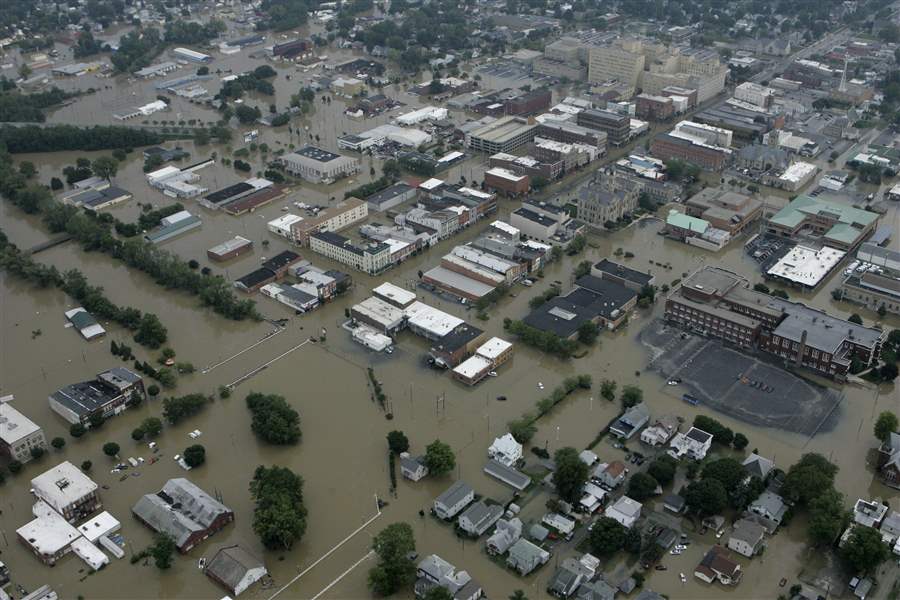
Rising flood insurance rates surprise property owners across Ohio, will impact thousands
3/24/2014
ADVANCE FOR USE MONDAY, MARCH 24, 2014 AT 3 A.M. AND THEREAFTER - FILE - This Aug. 22, 2007 aerial photo shows flood waters in downtown Findlay, Ohio. Many home and business owners across Ohio with national flood insurance are likely to be hit with rate increases in 2014. Around 20,000 property owners in the state are among the 1.1 million policyholders nationwide facing higher rates to rescue the debt-ridden National Flood Insurance Program, according to a review of federal data by The Associated Press. (AP Photo/Kiichiro Sato)
ASSOCIATED PRESS
FINDLAY — The slow-rising waters of the Blanchard River have flooded this northwestern Ohio city so often over the last decade that its residents are rarely caught off-guard.
Alongside Kelley McClurkin’s bakery and deli, a dozen sandbags are stacked and ready. What she wasn’t prepared for this year was a huge jump in her flood insurance payments.
“I about choked at my new figure,” she said.
About 20,000 property owners in Ohio are among the 1.1 million policyholders nationwide likely to see their federally subsidized flood insurance premiums rise to help rescue the debt-ridden National Flood Insurance Program, according to a review of federal data by The Associated Press.
President Barack Obama signed a law Friday putting the brakes on a 2012 overhaul that aimed to shore-up the program by requiring policyholders to begin paying risk-based rates, but for many the measure merely delays the premium increases.
Homeowners could pay up to 18 percent more annually until switching to a risk-based rate while business owners and those who own vacation homes will see their rates rise 25 percent each year until their premiums reach rates matching what building elevation surveys indicate is the true risk of flooding.
Findlay has about 800 property owners likely to see higher rates, the most of any city in Ohio. Other cities with more than 200 affected home and business owners include Lancaster, Athens, Columbus, Fairborn, Cincinnati, Newark, Kettering, West Carrollton, Marietta and Toledo.
Some of those who will see their rates rise live in places like Findlay where flooding is a constant worry, while many others will pay more despite living in cities where there have been very few damaging floods since the program began in the late 1970s.
“It’s a hard piece to swallow,” said McClurkin, who has owned the Bread Kneads bakery in Findlay for 13 years.
Her bakery, which sits near a creek that flows into the Blanchard River, has been surrounded by water several times but flooded just once — in 2007 when the worst flooding in nearly a century left behind $100 million in damage. It ruined McClurkin’s ovens, display cabinets and walk-in coolers.
This year’s 25 percent increase will cost her a couple thousand dollars. It’s an unexpected cost that means she won’t be able to put more money into the business or pass along a little more to her employees, she said.
No one is sure how high flood insurance rates will go, but the concern is that they could skyrocket so much that some houses are no longer affordable.
The worst case scenario is that some premiums would end up equaling a mortgage payment, said Todd Richard, the flood plain administrator in Findlay. “You can imagine what the impact would have on the marketability of that home,” he said.
Dozens of homeowners in the city hoping to avoid the huge hikes had their properties surveyed, and some were eventually removed from the flood plain, Richard said.
Ken Lewis, whose grandson owns a house along a creek swollen with melted snow and late-winter rains, said they’re not sure yet whether he’ll pay more or less for flood insurance after they had the home surveyed.
They’ve spent a lot of time and money renovating the house, including moving the water heater out of the flood-prone basement. Now they hope the potential for higher insurance premiums doesn’t pull down the home’s value.
“With the upgrades we’ve done, we don’t know if it will pay off,” Lewis said.